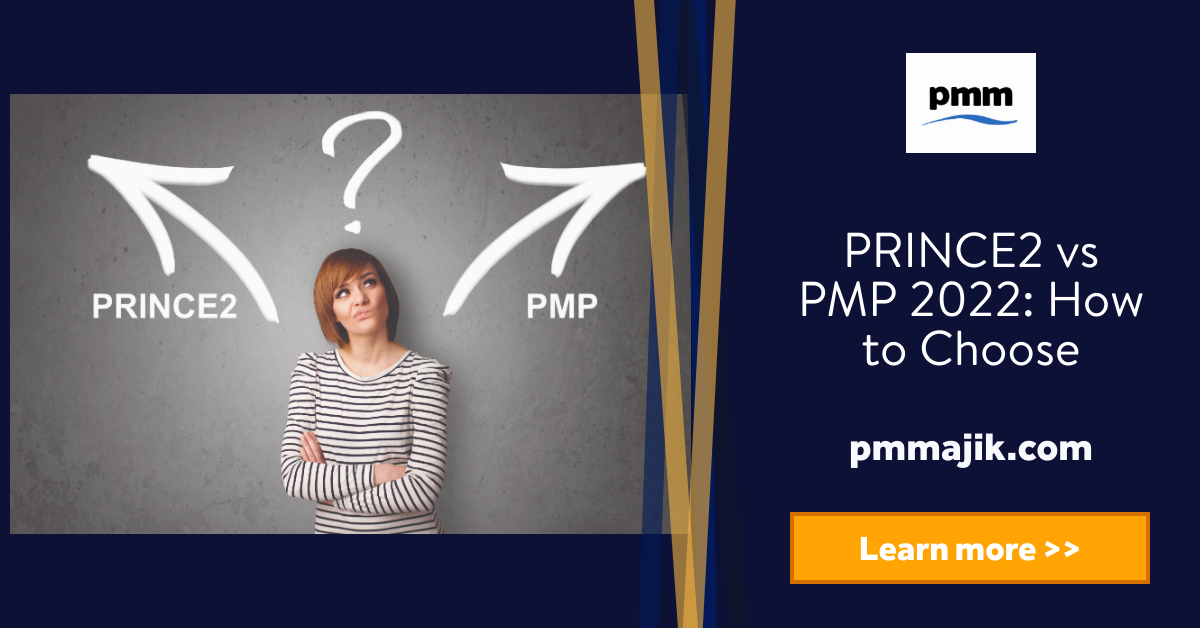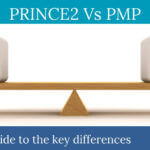Having the right certifications as a project manager or a project management office (PMO) professional can help you become more successful in your work. While there are a range of certifications, the main two are PRINCE2 vs PMP – how do you choose between them?
Both courses require investing time and money and each is a long-term commitment with regular recertification and personal development required. Before making the commitment, you need to weight up PMP vs PRINCE2 and see which is right for your career goals.
To that end, we’re going to look at:
- What PRINCE2 and PMP are
- What you learn from each project management certification
- Whether PMP and PRINCE2 are worth it
Including a comparison table to bring the important information together for you.
What is PRINCE2?
PRINCE2 (Projects in Controlled Environments) is a globally recognised project management methodology. It is the standard method in the UK that was initially developed for government projects and is now the gold standard of project management.
Along with the UK, it’s now popular across Europe, particularly the Netherlands and Germany and is also popular in Europe and Australia.
It’s a waterfall methodology that follows a step-by-step process which is practical and scalable. It allows organisation and control over the whole project from beginning to end, with clearly structured stages and a neat conclusion.
PRINCE2 follows seven principles, namely:
- Business justification – the must be a need and benefits
- Learn from every stage – record and learn from data generated
- Clearly define roles and responsibilities – this can be laid out in the project plan
- Plan work in stages – this makes a project measurable
- Management by exception – the project manager (PM) handles day-to-day management and the project board is in charge of meeting requirements
- Quality focus – deliverables are constantly monitored
- Tailor approach to the project – adjust the method to the scale and scope of the project
Whilst the seven phases of a PRINCE2 project are:
- Starting the project – confirm the reason for and capacity to complete the project
- Directing the project – if approved, the project is planned and delegated to the PM
- Initiating the project – the PM plans and schedules the project and passes it for approval
- Controlling the project – work is assigned and managed by the PM and team managers
- Managing delivery – progress is compared to the schedule and the project board tracks deliverables
- Managing stages – each stage is tracked and reviewed to ensure the project is on schedule and budget
- Closing the project – deliverables are handed over and outcomes are tracked and reported
What is PMP?
PMP (Project Management Professional) is the certification from the Project Management Institute and is most commonly accepted in the USA and Canada. It’s part of a broader suite of project management certifications, including the PfMP.
PMP is less a methodology and more like a framework. You’re given tools and techniques to apply to your project management and you then decide how to implement them into your project.
Within PMP there are a five process steps, contained in the Project Management Body of Knowledge (PMBOK), that you’re taught to follow:
- Initiating – determining the beginning of the project or phase
- Planning – identifying the scope and objectives of the project
- Executing – completing the work as per the project schedule and plan
- Controlling – monitor the progress against plans and ensure the project is on track
- Closing – complete the paperwork and hand over deliverables to the client
PMP is a theoretical framework which will help you understand the standards, conventions, best practices, terminology, and guidelines that are used in project management.
PRINCE2 vs PMP: Which should I use?
In terms of what you learn and how your employer will view the reputation of your certification, in the PRINCE2 vs PMP conversation, both are equal.
Here, we break down the key differences between the two to help you understand where to spend your time and money.
| PRINCE2 | PMP | |
| What you take away | A complete project management methodology | A framework to plan and run a project |
| Where it’s recognised | Globally | Globally |
| Where it’s used most | The UK, Europe, Australia | The USA, Canada, the Middle East |
| Time to recertification | Three years | Earn 60 Professional Development Unit points in three years |
| Cost for initial certification | £350-£1,000 for Foundation £750-£1,600 for Practitioner £200 exam fees may not be included | $555 for non-PMI members $405 for PMI members PMBOK is $150 for non-members and $60 for members |
| Potential salary effects | The average salary for a PM in the UK is £47,500 whilst a PRINCE2 certified PM averages £62,500 | PMI says that the PMP increases PM salaries by 16%, with an average salary of $113,000 |
You’ll need to weigh up where you want to work and what you want to get out of your certification before you choose PRINCE2 vs PMP in 2022.






